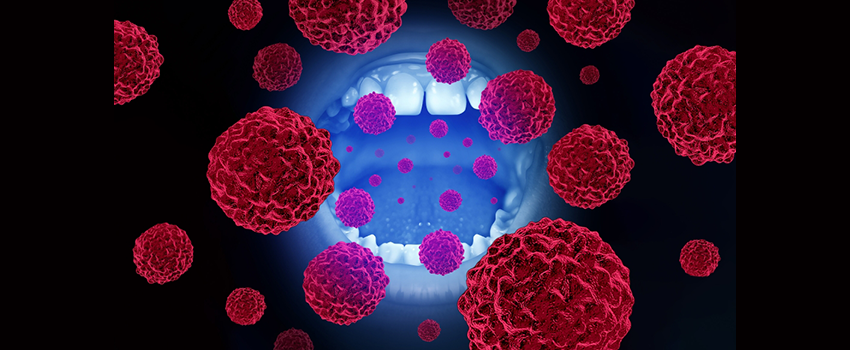Researchers learn saturated fatty acids promote immune escape of oral cancers
Media contact: Anna Megdell, 734-764-2220 | Patients may contact Cancer AnswerLine 800-865-1125
A study links obesity with dampened immune detection of oral cancers in mouse models.
 The team found that saturated fatty acids can block the STING pathway, which is induced by cytosolic DNA and promotes antigen-presenting cell maturation, by inducing a protein called NLRC3.
The team found that saturated fatty acids can block the STING pathway, which is induced by cytosolic DNA and promotes antigen-presenting cell maturation, by inducing a protein called NLRC3.Credit: Getty Images
A team from the University of Michigan Rogel Cancer Center and School of Dentistry, led by Yu Leo Lei, D.D.S., Ph.D., have identified a mechanism in mice for how obesity affects some oral cancers’ ability to escape from the immune system.
This study, published in Cell Reports, found that obesity helps to establish a type of tumor microenvironment that promotes tumor progression. How exactly this happens lies in the relationship between the saturated fatty acids, the STING-type-I interferon pathway, and NLRC3.
“We tend to think about the increased risks for gastrointestinal tumors, breast cancer, pancreatic cancer, and ovarian cancer when it comes to obesity,” said Lei, a pathologist-immunologist and lead author of this study. “Multiple recent prospective cohorts involving millions of individuals from several continents revealed a previously underappreciated link between obesity and oral cancer risks.”
“Myeloid cells in obese mice were insensitive to STING agonists and were more suppressive of T cell activation compared to the myeloid cells from leans hosts,” explained Lei. This feature drove the loss of immune subsets that were crucial for anti-tumor immunity in the tumor microenvironment.
The team found that saturated fatty acids can block the STING pathway, which is induced by cytosolic DNA and promotes antigen-presenting cell maturation, by inducing a protein called NLRC3.
Lei says this is the first study establishing a mechanistic link between obesity with oral cancer immune escape. “We’re excited about the translational implications,” he continued.
Obesity is a common comorbidity in cancer patients. Two recent studies found that oral cancer patients who were on statins—medicines that lower cholesterol—showed improved overall and cancer-specific survival.
“This study establishes a mechanistic link for those observations and highlights the potential of targeting fatty acids metabolism in remodeling the host anti-tumor immune response,” said Lei.
Next, Lei’s team will explore how obesity regulates other immune-activating pathways and identify novel intervention targets for better oral cancer prevention in high-risk individuals.
More work needs to be done before this can move to the clinic.
Additional authors: Blake Heath, Ph.D., Wang Gong, research Investigator at the School of Dentistry, and Hülya Taner, D.D.S.-Ph.D. candidate.
Shared resources used: Flow – Flow Cytometry; Histology – Tissue and Molecular Pathology
Funding: Biden Cancer Moonshot Initiative (U01 DE029255), R01 DE026728, R01 DE030691, R01 DE031951, F31 DE028740, and T32 AI007413.
Paper cited: “Saturated fatty acids dampen the immunogenicity of cancer by suppressing STING,” Cell Reports. DOI: 10.1016/j.celrep.2023.112303
